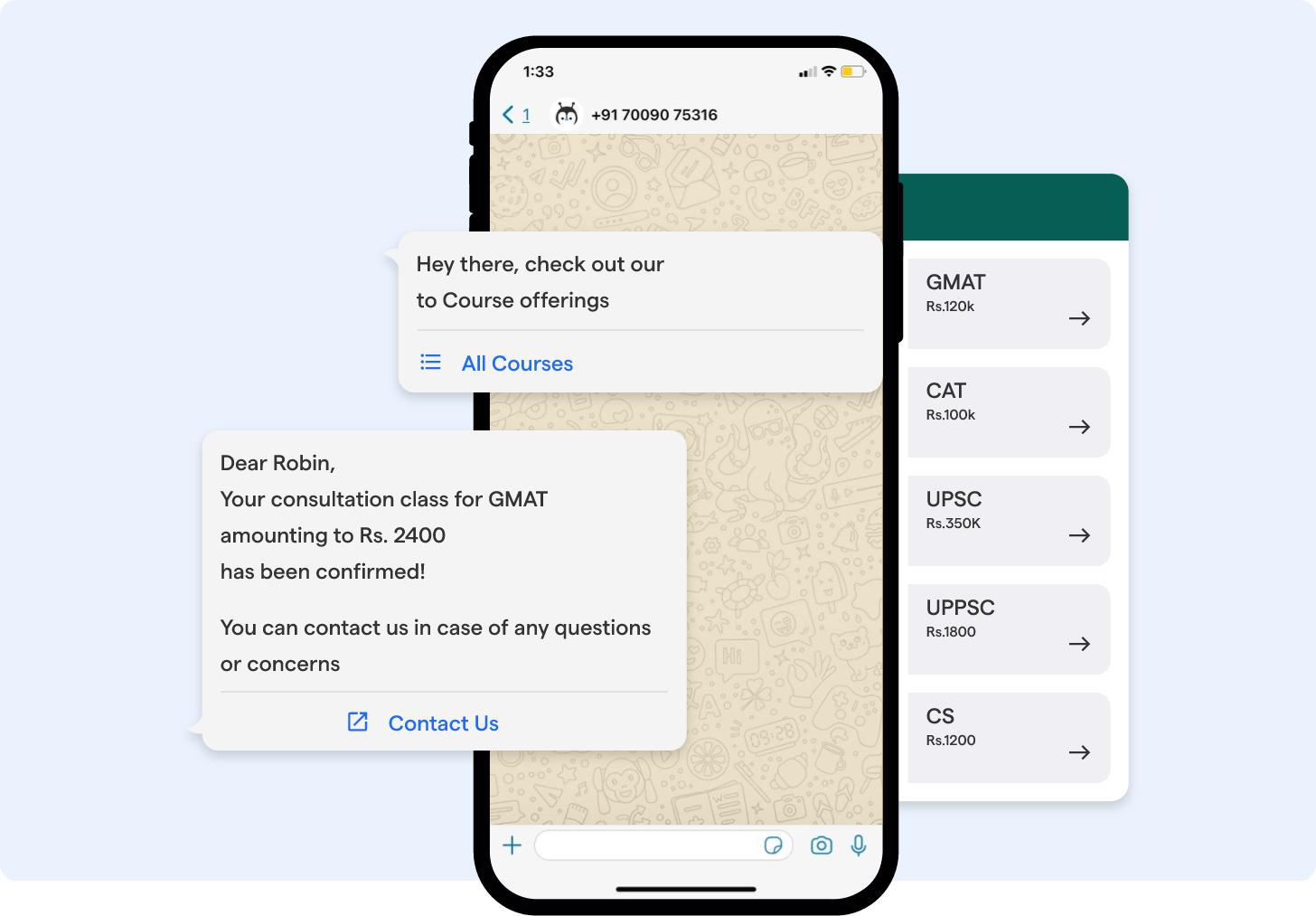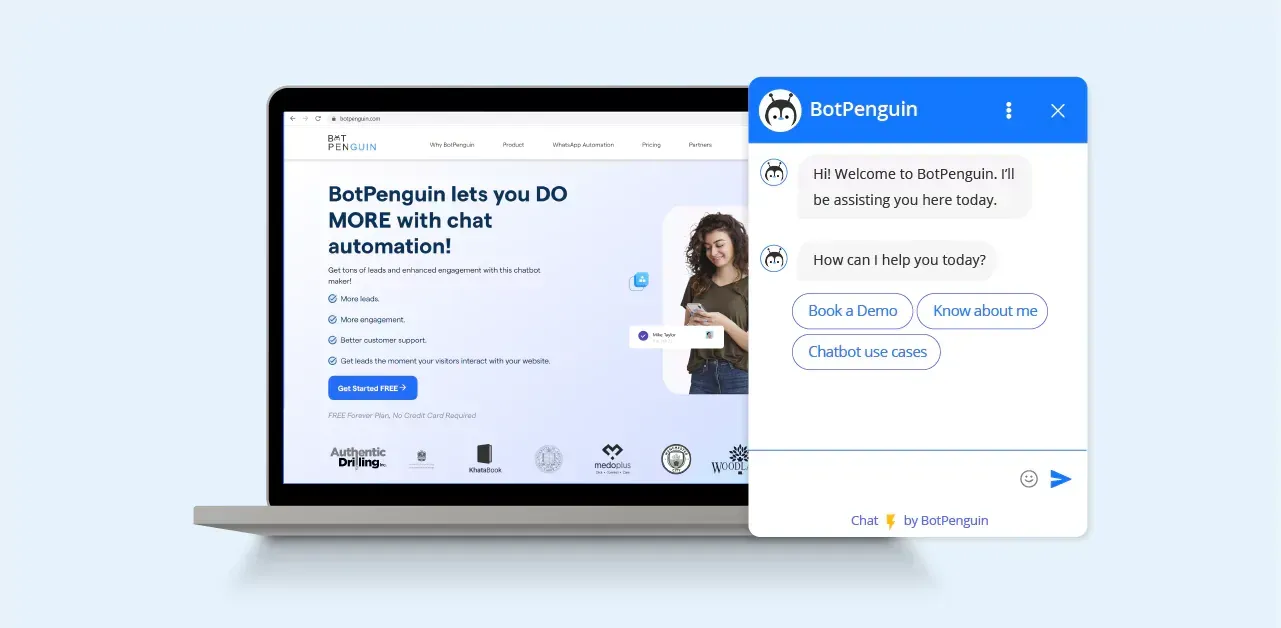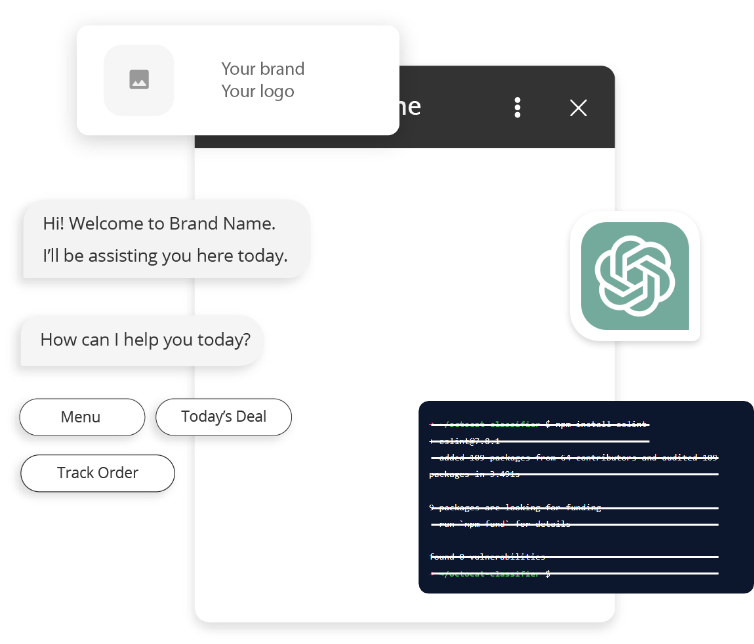Educators, enrich your students' learning experience with AI-powered chatbots. These virtual tutors provide personalized, on-demand support to improve comprehension and boost grades.
Chatbots can field common student questions at all hours, freeing up teachers' time. Their machine learning capabilities also allow them to adapt to each learner's abilities for a customized education.
Schools worldwide have already implemented chatbots to increase engagement, accessibility, and outcomes. The 24/7 availability removes barriers to learning while tracking progress provides data-driven insights.
Ready to implement chatbots at your institution? This guide covers best practices for integration. We'll discuss chatbot benefits, creating conversational flows, training the AI, deployment methods, and analyzing usage metrics. With strategic chatbot adoption, your school can become a leader in personalized, tech-enabled education.
Benefits of WhatsApp Chatbots for Education Support

WhatsApp chatbots offer enhanced accessibility, personalized learning experiences, and instant assistance for education support.
These benefits empower learners by providing flexible access to educational resources, tailoring content to their individual needs, and delivering immediate assistance when they need it the most.
Accessibility
WhatsApp chatbots make education support available to many learners by eliminating geographical and time barriers.
With the widespread use of smartphones and the popularity of messaging apps like WhatsApp, learners can access educational resources and support anytime, anywhere.
Chatbots enable learners to receive assistance, access learning materials, and engage in interactive lessons, regardless of location or time zone.
This accessibility empowers individuals who may not access traditional education support systems, such as those in remote areas or with physical limitations.
Personalized Learning
WhatsApp chatbots can tailor educational content based on individual needs and preferences.
Through AI algorithms, chatbots can analyze learners' interactions, track their progress, and understand their strengths and weaknesses.
This data enables chatbots to provide personalized recommendations, adaptive learning paths, and targeted resources to address specific learning gaps or areas of interest.
Chatbots offering tailored content promote a more engaging and effective learning experience, increasing learners' motivation and understanding.
Instant Assistance
One of the key advantages of WhatsApp chatbots is their ability to provide immediate answers and support to learners.
Traditional education support systems often rely on limited resources, such as teachers or tutors, who may not always be available around the clock.
Chatbots, on the other hand, can provide instant assistance by immediately responding to learner queries, providing explanations, and offering guidance.
Learners can receive immediate feedback on assignments or assessments, helping them stay on track and progress in their learning journey without any delays.
Enhanced User Engagement
WhatsApp chatbots have significantly improved user engagement by providing instant responses, personalized support, and interactive learning experiences.
Learners are more likely to engage with the chatbot and access the resources and information they need, leading to increased satisfaction and motivation.
Accessible Support
Chatbots have made education support more accessible, especially for remote or underserved learners. Students can access the chatbot anytime and from anywhere using their smartphones.
This has eliminated barriers such as time zone differences, physical distance, and limited support availability.

Improved Efficiency
Chatbots have reduced the administrative burden on educational institutions by automating routine tasks such as providing information, answering frequently asked questions, and guiding students through various processes.
This allows educators and staff to focus on more valuable activities and improve overall operational efficiency.
Personalized Learning Experience
Through AI capabilities, chatbots can provide personalized recommendations, adaptive learning paths, and tailored support based on individual learner needs and preferences.
This personalized approach has led to improved learning outcomes, increased learner engagement, and a more efficient use of educational resources.
Now, let us see how to implement WhatsApp Chatbots in education.
Implementing WhatsApp Chatbots in Education
By considering these factors and tips, you can effectively implement a WhatsApp chatbot in education that aligns with educational objectives, provides personalized support, and integrates seamlessly with existing systems.
Choosing the Right Chatbot Platform
When selecting a chatbot platform for implementation in education, it's important to consider the following factors:
- Features and Functionality: Look for a platform that offers the necessary features to support educational objectives, such as interactive content delivery, progress tracking, and personalized learning capabilities.
- Scalability: Consider the platform's scalability to ensure it can handle a potentially large number of users and interactions.
- Integration with WhatsApp: Ensure that the platform seamlessly integrates with WhatsApp, allowing for smooth communication with learners through the messaging app.
- Data Privacy and Security: Prioritize a platform prioritizing data privacy and security to protect learner information and comply with relevant regulations.
Customizing the Chatbot
To create a chatbot that aligns with educational objectives, consider the following tips:
- Clearly Define Objectives: Clearly define the specific educational objectives the chatbot is expected to support, such as providing subject-specific explanations, answering frequently asked questions, or assisting with homework.
- Engaging User Interface: Design a user-friendly and interactive interface that engages learners and encourages them to interact with the chatbot.
- Content Curation: Carefully curate educational content aligned with the curriculum, ensuring it is accurate, up-to-date, and relevant to learners' needs.
- Adaptive Learning: Incorporate adaptive learning capabilities into the chatbot's design, allowing it to personalize content delivery and tailor responses based on individual learner needs.
Integration with Existing Systems
To effectively integrate the chatbot with educational tools and platforms, consider the following steps:
- Identify integration points: Identify the existing educational tools, learning management systems, or platforms that you want the chatbot to integrate with, such as online learning platforms or student information systems.
- API Compatibility: Ensure that the chatbot platform provides the necessary APIs or integration options to connect with the existing systems seamlessly.
- Data Synchronization: Set up a process for synchronizing data between the chatbot and other educational systems to ensure accurate and up-to-date information exchange.
- User Onboarding: Plan and communicate the integration process with learners, educators, and administrators to ensure smooth onboarding and adoption of the chatbot within the existing educational ecosystem.
And taking your first step towards automation isn't that tough. Meet BotPenguin- the home of chatbot solutions. With all the heavy work of chatbot development already done for you, deploy chatbots for multiple platforms and make multi-channel support look easy for your education business:

Key Features of Education-Specific WhatsApp Chatbots
Enhance learning with WhatsApp education chatbots. Interactive content and assessments you can access anywhere. Bots track progress through analytics and provide tailored feedback.
AI assistance understands individual needs to support learning at each student's own pace. All within the familiar and easy-to-use WhatsApp app already on your phone.
Here are some of the key features of the Education chatbot.
Interactive Content Delivery
WhatsApp chatbots can engage learners with interactive content such as quizzes, assessments, and interactive lessons.
The chatbot can deliver multimedia content such as videos, images, audio files, and text-based content.
This interactive approach can enhance learner engagement and motivation, foster a deeper understanding of the subject matter, and provide immediate feedback to learners.
Progress Tracking
WhatsApp chatbots can track learner progress and provide personalized feedback to learners.
Chatbots can analyze the data generated through interaction with learners, such as quiz scores, time spent on each question, areas of strength, and areas of weakness.
This information can then be used to provide personalized recommendations to learners, track their progress, and provide timely interventions when needed.
AI-powered Assistance

WhatsApp chatbots can use AI algorithms to understand learner needs and provide tailored support.
Machine learning algorithms can analyze learner preferences, behavior, and performance and use this data to provide personalized recommendations and guidance.
This can help learners to progress at their own pace, understand concepts more deeply, and build confidence in their learning abilities.
Now, we will see some successful examples of WhatsApp Chatbots for Education.
Suggested Reading:
Successful Examples of WhatsApp Chatbots for Education
These examples demonstrate the positive impact of WhatsApp chatbots in education, ranging from improved communication and engagement to enhanced access to educational resources and personalized learning experiences.
Below are some examples.
Instituto Tecnológico y de Estudios Superiores de Monterrey (ITESM)
ITESM, a prestigious university in Mexico, implemented a WhatsApp chatbot called Tita Bot.
Tita Bot provides students with information on admissions, courses, exams, academic schedules, and campus services.
It also helps users find study materials, access online courses, and get support for administrative tasks.
The chatbot has significantly improved student engagement and satisfaction by providing immediate and personalized support, reducing waiting times, and enhancing accessibility to university resources.
University of Johannesburg
The University of Johannesburg in South Africa uses a WhatsApp chatbot called "UJChat" to enhance student communication and support.
UJChat provides students with access to various university services, including admissions information, course registration, financial aid, and campus facilities.
It also facilitates Q&A sessions with university representatives. The chatbot has led to improved communication efficiency, reduced administrative burden, and increased student satisfaction.
Babraham Institute
The Babraham Institute, a biomedical research institute in the UK, developed a WhatsApp chatbot called "Max."
Max supports the Institute's science outreach program by providing interactive educational content, sharing science news and facts, and answering user questions related to biology and scientific research.
Max has successfully engaged students and the wider community in science education, making complex scientific concepts more accessible and fostering curiosity and interest in the field.
The impact and outcomes achieved through these implementations have been remarkable.
Now we will cover some of the potential challenges and solutions.
Suggested Reading:
Potential Challenges and Solutions
In this section, we will cover some of the potential challenges that you may face while using WhatsApp chatbot to provide education support.
But do not worry by following the below solution you can easily overcome the challenges.
Language and Dialect Variations
WhatsApp chatbots may need to handle multiple languages and dialects.
To address this challenge, consider leveraging natural language processing (NLP) techniques to understand and respond to different languages and dialects.
Use translation APIs or language detection algorithms to provide relevant responses in the user's preferred language.
Technical Integrations
Integrating the chatbot with existing systems and platforms can be complex. To overcome this challenge, ensure that the chatbot platform provides the necessary APIs or integration options.
Work closely with IT teams to establish data synchronization and ensure a seamless integration with educational systems.
User Adoption and Training
Some users may be hesitant or unfamiliar with using chatbots.
To promote user adoption, provide clear communication and training materials to educate users on how to interact with the chatbot effectively.
Offer ongoing support channels for users to ask questions and seek assistance whenever needed.
Conclusion
Chatbots have immense potential to enhance the education sector by improving learning outcomes, increasing access and personalizing the student experience.
By using WhatsApp's widespread reach, institutions can deliver on these benefits at scale.
Botpenguin empowers educators to build powerful, customizable WhatsApp chatbots that engage and assist students through our preferred messaging platform.
Its simple, no-code interface makes chatbot creation a breeze, while pre-built templates save time. Integrations with other tools enable a unified digital experience.
Botpenguin's advanced AI capabilities like ChatGPT integration and analytics provide deeper insights to personalize learning.
Students get 24/7 assistance in an interactive, media-rich format. The platform's flexibility supports multilingual and omnichannel requirements.
By choosing Botpenguin, institutions can give students an always-on, personalized learning companion. Educators gain valuable time and tools to enhance course delivery.
If you're looking to supplement traditional education with an always-on virtual teaching assistant, Botpenguin is the ideal platform to unlock WhatsApp's potential for accessible, engaging, and effective learning support.
Suggested Reading:
Frequently Asked Questions (FAQs)
What is a WhatsApp chatbot for education support?
A WhatsApp chatbot is an artificial intelligence software that allows students to engage in a conversational interface. The chatbot provides instant assistance on admission, orientation, administrative queries, and other academic information.
How can educators leverage WhatsApp chatbots for education support?
Educators can leverage WhatsApp chatbots for education support by integrating chatbots with existing systems and platforms. They can provide instant and accessible assistance to learners, delivering personalized recommendations, adaptive learning paths, and tailored support.
What are the benefits of using WhatsApp chatbots for education support?
WhatsApp chatbots offer several benefits, including enhancing user engagement, automating routine tasks, improving accessibility, and providing personalized learning experiences. Chatbots can promote learner satisfaction, streamline administrative processes, and offer improved educational outcomes.
What features should be included in a WhatsApp chatbot for education support?
A WhatsApp chatbot for education support must include features such as personalized recommendations, interactive learning experiences, multiple language support, and easy navigation. It should also be user-friendly, intuitive, and maintain data privacy to promote user adoption.
What challenges may arise when using WhatsApp chatbots for education support?
Challenges such as language and dialect variations, technical integrations, user adoption, and data privacy concerns may arise when using WhatsApp chatbots for education support. These challenges can be overcome by implementing effective solutions such as APIs and training materials.
How can educational institutions ensure the success of WhatsApp chatbots for education support?
Educational institutions can ensure the success of WhatsApp chatbots for education support by identifying specific educational goals, involving educators and students in the design and validation process, and continuously updating educational content delivered by the chatbot. They can also establish data synchronization and incorporate user feedback.


